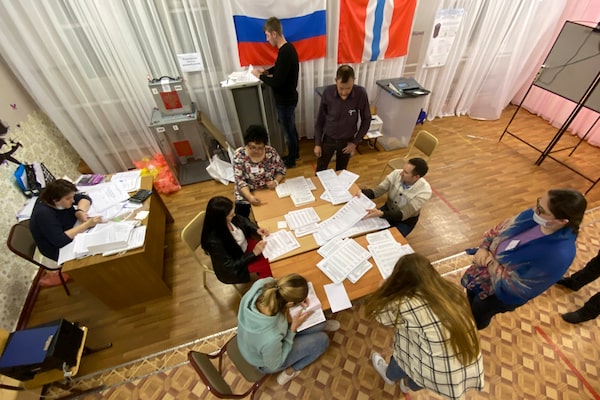
Members of an election commission prepare to count ballots after voting at a polling station after the parliamentary elections in Nikolayevka village outside Omsk, Russia, on Sept. 19, 2021.Evgeniy Sofiychuk/The Associated Press
Russia’s ruling United Russia party, which supports President Vladimir Putin, retained its majority in parliament after a three-day election and a sweeping crackdown on its critics, despite losing around one fifth of its support, partial results on Monday showed.
With 33% of ballots counted, the Central Election Commission said United Russia had won just over 45% of the vote, with its nearest rival, the Communist Party, at around 22%.
Although that amounts to an emphatic win, it would be a weaker performance for United Russia than the last time a parliamentary election was held in 2016, when the party won just over 54% of the vote.
A malaise over years of faltering living standards and allegations of corruption from jailed Kremlin critic Alexei Navalny have drained some support, and a tactical voting campaign organized by Navalny’s allies appears to have inflicted further damage.
Kremlin critics said the vote was in any case a sham and that United Russia would have fared much worse in a fair contest, given a pre-election crackdown that outlawed Navalny’s movement, barred his allies from running and targeted critical media and non-governmental organisations.
The result looks unlikely to change the political landscape, with Putin, who has been in power as president or prime minister since 1999, still dominating ahead of the next presidential election in 2024. Putin has yet to say whether he will run.
The 68-year-old leader remains a popular figure with many Russians who credit him with standing up to the West and restoring national pride.
Partial results showed the Communist Party finishing in second place, followed by the nationalist LDPR party with around 9%. Both parties usually back the Kremlin on key issues.
At a celebratory rally at United Russia’s headquarters broadcast on state television, Moscow Mayor Sergei Sobyanin, a close ally of the Russian leader, shouted: “Putin! Putin! Putin!” to a flag-waving crowd that echoed his chant.
Allies of Navalny, who is serving a jail sentence for parole violations he denies, had encouraged tactical voting against United Russia, a scheme that amounted to supporting the candidate most likely to defeat it in a given electoral district.
In many cases, they had advised people to hold their noses and vote Communist. Authorities had tried to block the initiative online.
The Central Election Commission was slow to release data from online voting in Moscow, where United Russia traditionally does not fare as well as in other regions. Pro-Kremlin candidates were leading in the majority of the city’s 15 districts before the online votes were tallied.
Golos, an election watchdog accused of being a foreign agent by authorities, said it had recorded thousands of violations, including threats against observers and ballot stuffing, blatant examples of which circulated on social media, with some individuals caught on camera depositing bundles of voting slips in urns.
The Central Election Commission said it had recorded 12 cases of ballot stuffing in eight regions and that the results from those polling stations would be voided.
DOMINANCE
United Russia held nearly three quarters of the outgoing State Duma’s 450 seats. That dominance helped the Kremlin pass constitutional changes last year that allow Putin to run for two more terms as president after 2024, potentially staying in power until 2036.
Navalny’s allies were barred from running in the election after his movement was banned in June as extremist. Other opposition figures allege they were targeted with dirty tricks campaigns.
The Kremlin denies a politically driven crackdown and says individuals are prosecuted for breaking the law. Both it and United Russia denied any role in the registration process for candidates.
“One day we will live in a Russia where it will be possible to vote for good candidates with different political platforms,” Navalny ally Leonid Volkov wrote on Telegram messenger before polls closed on Sunday.
One Moscow pensioner who gave his name only as Anatoly said he voted United Russia because he was proud of Putin’s efforts to restore what he sees as Russia’s rightful great-power status.
“Countries like the United States and Britain more or less respect us now like they respected the Soviet Union in the 1960s and 70s. … The Anglo-Saxons only understand the language of force,” he said.
There was also widespread apathy, with official figures showing turnout at around 47%.
“I don’t see the point in voting,” said one Moscow hairdresser who gave her name as Irina. “It’s all been decided for us anyway.”
Our Morning Update and Evening Update newsletters are written by Globe editors, giving you a concise summary of the day’s most important headlines. Sign up today.